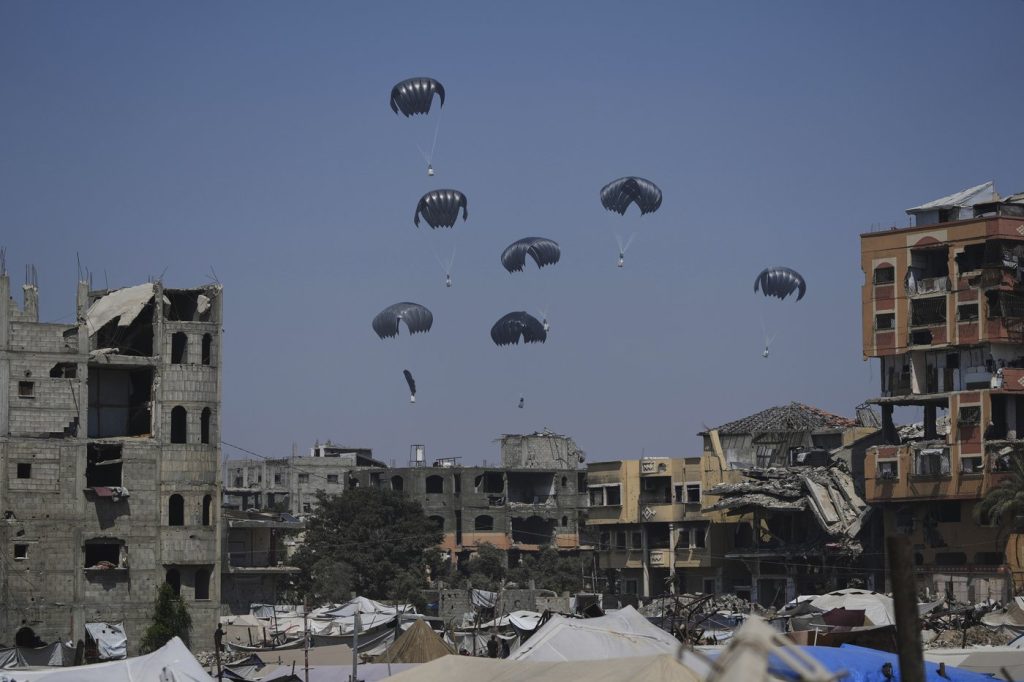DEIR AL-BALAH, Gaza Strip (AP) — The Israeli military has initiated limited pauses in combat across three densely populated areas in Gaza to facilitate humanitarian efforts. These pauses will last for 10 hours a day, specifically from 10 a.m. to 8 p.m., in Gaza City, Deir al-Balah, and Muwasi. This move comes amid rising concerns regarding severe hunger in the region, as Israel faces intensified criticism over its operational conduct throughout a protracted 21-month conflict.
The military indicated that these "tactical pauses" aim to increase the influx of humanitarian aid into Gaza. Tom Fletcher, the United Nations humanitarian chief, expressed approval of Israel’s decision to implement a one-week enhancement of humanitarian assistance, noting some easing of movement restrictions but emphasizing the need for sustained and substantial action.
Israeli Prime Minister Benjamin Netanyahu commented, “Whichever path we choose, we will have to continue to allow the entry of minimal humanitarian supplies.” However, images of severely malnourished children have amplified criticism against Israel, even from its allies, who demand an end to the ongoing war. The Israeli government maintains that Hamas exploits aid means to fortify its rule, although it has not provided concrete evidence of such actions. Currently, the population within Gaza, exceeding 2 million individuals, is increasingly reliant on external aid.
Despite the announced pauses, combat operations have not entirely ceased. Health officials in Gaza reported that Israeli airstrikes resulted in the deaths of at least 41 Palestinians between late Saturday and Sunday, including 26 individuals seeking aid. Palestinian residents, like Sabreen Hassona, recounted struggles to procure basic food supplies, with one expressing gratitude for receiving a kilo of rice after over a week's absence of flour in their household. Conversely, others described frustrations over the slow delivery of aid, with some reporting that despite seeing planes, they did not witness any aid being distributed.
Israel’s military stated that 28 aid packages containing food were airdropped and claimed to establish secure routes for agricultural supply delivery, purportedly in collaboration with the U.N. and humanitarian organizations. Despite this, the U.N. World Food Program declared that while nearly half a million individuals are facing famine-like situations in Gaza, the amount of aid provided remains grossly insufficient to remedy the prevailing starvation crisis.
Reports indicated that 63 malnutrition-related deaths were attributed to the conditions in Gaza in July, with 24 of those involving children under five years of age. Dr. Muneer al-Boursh, the health ministry's director-general, urged for an influx of medical supplies to address child malnutrition, insisting that meaningful humanitarian interventions are necessary to save lives.
Ceasefire negotiations appear tenuous, as Israel and the U.S. recently withdrew negotiating teams from Qatar, attributing the breakdown to Hamas while Israel contemplated alternative strategies beyond discussions. Israel claims readiness to conclude the war should Hamas agree to surrender, disarm, and go into exile, terms that Hamas refuses to accept.
After ceasing the latest ceasefire in March, Israel reinstated a blockade on essential supplies, including food and medicine, aiming to pressure Hamas regarding the release of hostages. Currently, 50 hostages remain in Gaza, with many believed to be deceased. Under mounting international scrutiny, Israel minimally eased its blockade in May; however, deliveries have drastically fallen short of the U.N. estimates of 500 to 600 trucks required daily, leading to widespread hunger and unrest. The U.N. has struggled to dispense aid effectively, noting that desperate crowds often seize supplies from trucks.
In response to aid delivery challenges, Israel has promoted the U.S.-registered Gaza Humanitarian Foundation, which opened four aid distribution centers in May. However, reports indicate over 1,000 Palestinians have been killed since May while attempting to obtain food, especially near these designated sites. While Israel contends that the U.N. aid system allows Hamas to pilfer resources, the U.N. has rejected these allegations.
The situation escalated when Awda Hospital in Nuseirat reported that Israeli forces killed at least 13 individuals, including four children, as they sought aid at a GHF distribution site in central Gaza. The military claimed it fired warning shots to deter perceived threats from approaching groups. Furthermore, Palestinian residents endured additional fatalities while seeking assistance in other locations, further compounding the crisis.
Since the onset of the conflict on October 7, 2023, following a Hamas assault that killed 1,200 people and resulted in the abduction of 251 hostages, Israeli retaliatory measures have led to over 59,700 Palestinian deaths, according to Gaza's Health Ministry. The U.N. and various international bodies consider the ministry a reliable source for casualty figures, despite its operation under the Hamas government.
U.S. President Donald Trump remarked on Sunday that the imagery of starving and malnourished children in Gaza is “terrible.”












